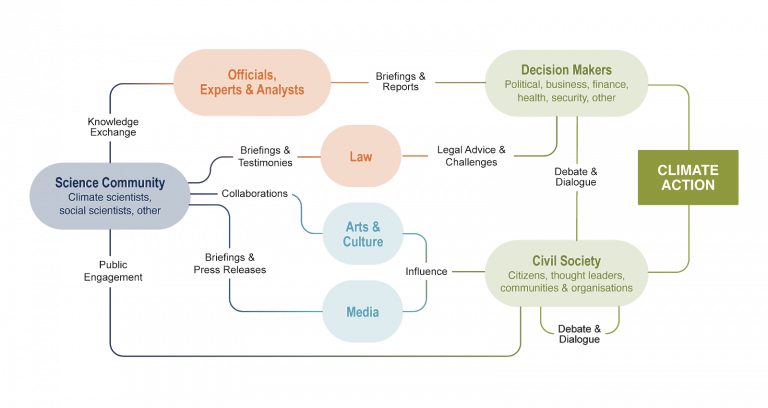UCL Policy Commission on Communicating Climate Science II
The UCL Communicating Climate Science Policy Commission (CCSPC) is an interdisciplinary body comprising experts from academia, policy, environment, business, media and the arts.

10 May 2018
The UCL Policy Commission on Communicating Climate Science (CCSPC) II, chaired by Professor Chris Rapley (UCL Earth Sciences), comprised of a cross-disciplinary project group of researchers from psychology, neuroscience, science and technology studies, earth sciences and energy research. The commission was delivered in two phases, with the phase continuing to examine the challenges faced in communicating climate science effectively to policymakers and the public, and the role of climate scientists in communication.
About
The UCL Communicating Climate Science Policy Commission (CCSPC II) is an interdisciplinary body comprised of experts from academia, policy, environment, business, media and the arts.
Chaired by Professor Chris Rapley (UCL Earth Sciences), phase two of the Commission continued to examine the challenges faced in communicating climate science effectively to policymakers and the public, and the role of climate scientists in communication.
The Commission’s vision was to facilitate the creation of agency (the ability to make change) to increase the effectiveness, scale, and pace of actions addressing the climate crisis.
The UCL CCSPC II is supported by the UCL Grand Challenge for Sustainable Cities and UCL Public Policy. UCL Public Policy seeks to bring UCL's academic expertise to bear on pressing public policy challenges by integrating knowledge and evidence from across disciplines to inform policy.
Mission
The commission is an incubator of projects that aim to:
- Identify gaps in climate change communication and policy and create targeted interventions with significant impacts
- Help break down communication barriers within and between professional communities and the wider public
- Identify and work with ‘communities of practice’ to allow scaling of successful encounters
Vision
The Commission’s vision is to facilitate the creation of agency (the ability to make change) to increase the effectiveness, scale, and pace of actions addressing the climate crisis.
The Commission draws on selected insights from the social, behavioural and mind sciences, from the varied and extensive experience of its membership, from the ideas and insights of invited experts, and from ‘learning by doing’.
The figure below is a schematic of the climate science-society domain, which the Commission uses as a map to guide its interventions:

Outputs and impact
- UCL Policy Commission on Communicating Climate Science (I) published a report 'Time for Change?' outlining five key recommendations for professional communities involved in climate science. In addition to the full report a policy briefing was produced.
- Short report of the experiential event ‘Seeing Yourself See’ (pdf), held as part of the UCL Commission in 2013
- A commissioned review of psycho-sociology in the context of psychology and neuroscience ‘Psychosocial Contributions to Climate Sciences Communications Research and Practice’ (pdf)
- Contributed written evidence to the Environmental Audit Select Committee, oral evidence to the House of Commons Science and Technology Committee as part of the ‘Climate: Public Understanding And Policy Implications’ and cited by the same committee in their report ‘Communicating climate science. Eight report of session 2013-2014’.
- Developed and delivered training science communication training for NERC doctoral students with an increasing number of universities participating.
Completed projects
Media engagement: BBC1 “Climate Change – The Facts”
Chris Rapley was the science consultant for the BBC1 programme “Climate Change - The Facts” – aired in the UK in April 2019, and for the two-part version subsequently distributed worldwide. UCL’s Professor Mark Maslin featured prominently. Professor Rapley and the Series Producer, Serena Davies, are working on the development of several potential follow-up programmes. Professor Rapley is also providing advice to Nutopia, who have been commissioned by National Geographic Channel to produce a ten-part follow up to the award winning series “One Strange Rock”.
Workshop: Meaningful Action
In January 2019, the Commission brought together 30 people from a variety of professional backgrounds but with extensive experience of addressing climate change. The aim of the meeting was to uncover better answers to a question that concerned citizens increasingly ask: “What can I do about climate change?”
Training programme: Flood Risk Management
In this free residential training retreat UCL offered climate scientists a unique opportunity to develop understanding, tools and techniques to engage more effectively with policymakers. Over two-and-a-half-days the programme explored the process of co-production and iterative dialogue between climate scientists and those charged with reducing flood risks and addressed barriers to progress such as cultural differences in the perception of risk consider the need to take into account human psychology and values in developing effective public policy.
Workshop: Developing Better Climate Mitigation Policies
In February 2018, the Commission brought together 30 policymakers, climate researchers and research funders to explore how climate change risk assessments (CCRAs) can be made a more effective driver of climate change mitigation policies. The workshop mapped key challenges as well as opportunities for improvement.
 Close
Close

